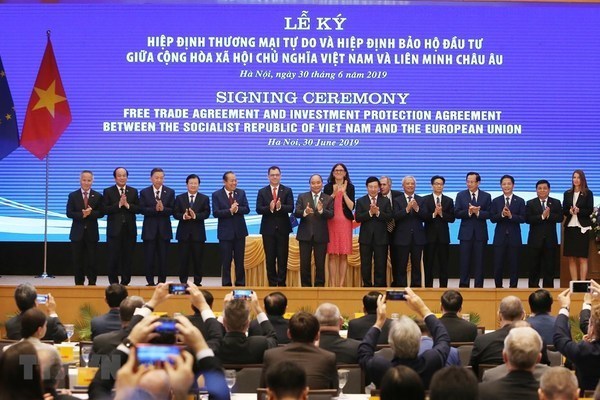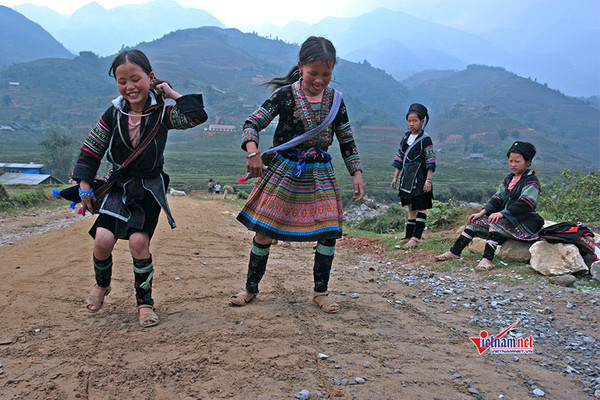 |
|
PM Nguyen Xuan Phuc and delegates pose for photos at the signing ceremony of the EVFTA and EVIPA between Vietnam and the European Union. Photo: Lam Khanh/VNA
|
In the current trend of globalization, human rights are a matter of great concern of many countries.
The Government of Vietnam always recognizes that respect, protection and promotion of human rights and fundamental freedoms are the basic principles of all socio-economic development strategies of the country, and at the same time the accomplishment of its commitments to international and institutional frameworks to which Vietnam is a member. The fact shows that, by proactively and actively integrating with the world, Vietnam has achieved many successes in socio-economic development, contributing to maintaining regional and international peace and stability, and creating an important basis and premise for ensuring and enforcing human rights.
The white paper on human rights 2018 strongly affirmed Vietnam's position on human rights. The guarantee and promotion of human rights is the responsibility and authority of each nation. States have the responsibility to develop the domestic legal system in accordance with the basic principles of international law, especially the UN Charter, taking into account the circumstances of each country to ensure that the people can enjoy human rights in the best way. Due to differences in historical circumstances, political regimes, levels of development, and values of cultural traditions ... the approaches to human rights of each country may differ.
Cooperation and dialogue between nations to promote and protect human rights is a necessary and objective requirement. Vietnam supports the strengthening of international cooperation in the field of human rights on the basis of equal, constructive dialogue and mutual respect and understanding, without interfering in each other's internal affairs, for the common goal of promoting and better protecting human rights.
 |
|
By proactively and actively integrating into the world, Vietnam has achieved many successes in socio-economic development, contributing to maintaining regional and international peace and stability, creating foundations and prerequisites for ensuring and enforcing human rights. Photo LAD
|
In a study published in the Journal of Political Theory a few years ago, Tran Thi Hoe from the Human Rights Research Institute, Ho Chi Minh National Academy of Politics, concluded: International integration contributes to the development of legal thinking on human rights.
According to Hoe’s study: The 1992 Constitution, the Constitution of the period of renovation and integration noted: “In the Socialist Republic of Vietnam, human rights, particularly political, civil, economic, cultural and social rights, are respected, showing through civil rights and being stipulated in the constitution and laws ”(Article 50). This is the first time in Vietnam's constitutional history that the phrase "human rights" has been officially recorded in the Constitution.
Based on the achievements of innovation and international integration, Vietnam amended and supplemented the 1992 Constitution and it was approved by the National Assembly on November 28, 2013.
The 2013 Constitution affirms and upholds the State's responsibility to recognize, respect, implement and protect human and civic rights. In addition to the principle: "Political, civil, economic, cultural and social and human rights are recognized, respected, protected and guaranteed according to the Constitution and laws" (Article 14), most articles stipulate the State's responsibilities and guarantees to citizens, for example, Article 17: The State protects Vietnamese citizens abroad; Article 28: The state creates favorable conditions for citizens to participate in state and social management; publicity and transparency in receiving and responding to citizens' opinions and proposals, etc."
In the spirit of the 1966 International Covenant on Civil and Political Rights and the 1966 International Covenant on Economic, Social and Cultural Rights, the 2013 Constitution laid down the principle in Article 14, overcoming the arbitrariness in restricting rights: “Human rights and civil rights can only be restricted in accordance with the law in case of necessity for reasons of national defense, national security, social order and security, social ethics, community health”. Accordingly, no one may arbitrarily mutilate or restrict rights, except for necessary cases mentioned by the Law.
A new feature of the 2013 Constitution is the supplementation of a number of rights, such as: "The right to live in a clean environment" (Article 43), "The right to enjoy and access cultural values, to participate in cultural life, and use of cultural facilities” (Article 41), showing progress in expanding and developing human rights, reflecting the results of the renovation process of nearly 30 years in Vietnam.
The content and scope of the subject has made a clear development of legal thinking in defining human rights in Vietnam’s Constitution and legal system. The recognition of common human values of human rights is a testament to Vietnam's active participation in the process of international integration.
 |
|
Healthcare for the people has gained many important achievements. Illustrative image.
|
International integration creates favorable opportunities for rapid and sustainable economic development - a necessary condition to guarantee and promote human rights in Vietnam.
Thanks to the opportunities brought about by international integration, Vietnam's economy has experienced rapid growth. Economic sectors developed, making important contributions to the economy, especially in creating jobs and improving the lives of people. The total investment capital of the whole society increased, the economy grew, creating conditions for the State to invest more in priority objectives such as education, health, building public infrastructure, developing human resources, hunger eradication, poverty alleviation, assistance to disadvantaged areas ... Vietnam has become one of the first countries in the world to achieve the United Nations Millennium Development Goal on hunger eradication and poverty reduction. The national poverty line of Vietnam has also gradually been raised and is gradually approaching the international poverty line. Vietnam's recent success in economic growth and stability has contributed significantly to better and better guarantee of the rights of the people in all fields.
International integration promotes comprehensive cooperation between Vietnam and other countries and international organizations, whereby human rights are not only guaranteed at the national level but also at the international level:
In the process of international integration, Vietnam always attaches great importance to international cooperation in the field of human rights, and always respects the universality of human rights.
To date, Vietnam has joined most important international human rights conventions, including the 1966 Economic, Social and Cultural Rights Convention, and strictly fulfills its obligations as a member state.
As an active member of the UN Human Rights Conventions, Vietnam and other countries have established an international monitoring mechanism to ensure and promote human rights on national territory. In this mechanism, a human rights committee has been established and member states are obliged to develop and defend periodic national reports on implementation of the Convention before the committee.
Vietnam recently defended its 2nd Periodic Review of Human Rights before the UN Human Rights Council, with the participation of 107 countries, and was highly appreciated by the international community.
As a member of the United Nations Human Rights Council for the 2014-2016 term (184/193 votes of confidence), Vietnam has promoted its active behavior and initiative in international integration.
Undeniably, the process of formation and operation of the above-mentioned international mechanisms imposes mandatory obligations on member states, forcing them to take all necessary measures to ensure and promote basic human rights. That is also the basis for the realization of human rights of people in the territory of the member states in general and Vietnam in particular.
Hai Van
 Vietnam has achieved many successes in socio-economic development, contributing to maintaining regional and international peace and stability, and creating an important basis and prerequisite to ensure and enforce human rights.
Vietnam has achieved many successes in socio-economic development, contributing to maintaining regional and international peace and stability, and creating an important basis and prerequisite to ensure and enforce human rights.